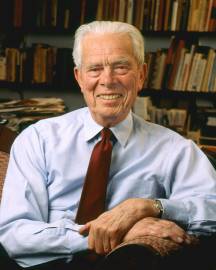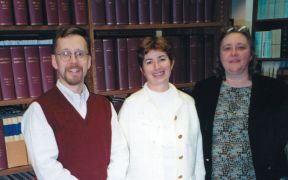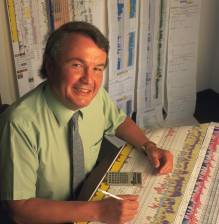geotimesheader
Society Page
News about
people and
announcements
from
AGI's 37
member societies
______________________ |
To
post news in Society Page, send e-mail to geotimes@agiweb.org
with the subject: Society Page. |
Contents:
National Honor

President Clinton awarded the National Medal of Science to 12 scientists
from across the country on Dec. 1. Of the three awardees honored for their
work in the physical sciences, Gilbert F. White was the sole earth
scientist. White is a distinguished professor emeritus of geography at
the University of Colorado, Boulder, and a member of the American Geophysical
Union. His work has helped shape the nation's policies on flood plains,
water use and natural disasters for more than five decades.
[At right: Gilbert White, father of floodplain
management. Courtesy of Peter Caughey, University of Colorado-Boulder news
services]
In 1942, White titled his doctoral dissertation from the University
of Chicago: "Floods are 'acts of God,' but flood losses are largely acts
of man." Today he is known as the "father of floodplain management." White
has made major contributions to the study of water systems in developing
countries, global environmental change, international cooperation, nuclear
winter, geography education and the mitigation of natural hazards including
earthquakes, hurricanes and drought.
He is founder of the Natural Hazards Research and Applications Information
Center at the University of Colorado and former director of its Institute
of Behavioral Science. At 88, White is still active on the Boulder campus
where he has been a faculty member since 1970, after 14 years as a professor
at the University of Chicago and 10 years as president of Haverford College
in Pennsylvania.
The National Medal of Science was established in 1959 and has been awarded
to 386 distinguished scientists and engineers. For more information and
a complete list of recipients visit the Web site at www.nsf.gov/nsb/awards/nms/start.htm.
Coming to
America
The Geoscience Information Society provided Theodora Zoto of
Albania an international fellowship in November to attend the society's
annual meeting in Reno and spend four weeks in North America. Zoto is Chief
of Library, Archive and Information of the Institute for Geological Research
of the Geological Survey of Albania in Tirana, Albania.
 The fellowship
program was established in 1998 to assist geoscience information specialists
and geoscience librarians who work in a geological survey or academic institution
in a developing nation. The Society hopes that honorees, upon their return
to their organizations, will develop seminars and workshops to share their
new skills and broaden the expertise of their co-workers at both the local
and national level.
The fellowship
program was established in 1998 to assist geoscience information specialists
and geoscience librarians who work in a geological survey or academic institution
in a developing nation. The Society hopes that honorees, upon their return
to their organizations, will develop seminars and workshops to share their
new skills and broaden the expertise of their co-workers at both the local
and national level.
[Pictured left to right: Shaun Hardy of the
Carnegie Institution of Washington DTM-Geophysical Laboratory with Geoscience
Information Society (GIS) Fellow Theodora Zoto and GIS president Sharon
Tahirkheli. Photo courtesy of GIS]
Zoto was interested in learning more about automating a library and
providing Internet access to the collection and its resources. During her
stay she visited the U.S. Geological Survey Library in Reston, Va.; the
American Geological Institute in Alexandria, Va.; the Carnegie Institution
of Washington's Geophysical Laboratory Library; and the Earth and Mineral
Science Library at Pennsylvania State University in University Park, Penn.
For more information on the fellowship visit www.geoinfo.org.
New officers for the society include Sharon Tahirkheli, director
of GeoRef/Information Systems at the American Geological Institute, as
president; Michael Noga, collection manager and mathematics librarian
at the Massachusetts Institute of Technology Libraries, as vice-president
and president-elect; Suzanne Larsen, head of the Jerry Crail Johnson
Earth Sciences and Map Library at the University of Colorado, Boulder,
as secretary; and April Love of the University of California in
Irvine as treasurer.
An interview
with SPWLA president Philippe Theys
 The American
Geological Institute welcomed two new member societies at the end of 2000.
Below is an interview with Philippe Theys, president of the Society of
Professional Well Log Analysts (SPWLA). Next month, Geotimes interviews
John Nicholl, president of the Environmental and Engineering Geophysical
Society.
The American
Geological Institute welcomed two new member societies at the end of 2000.
Below is an interview with Philippe Theys, president of the Society of
Professional Well Log Analysts (SPWLA). Next month, Geotimes interviews
John Nicholl, president of the Environmental and Engineering Geophysical
Society.
[At right: Philippe Theys, deep in well-log
data. Courtesy of SPWLA]
What are the challenges you face in voicing
the role of SPWLA’s members in today's society?
Petrophysicists plan and implement the acquisition of logging and core
data, control the acquired data, and then analyze and format it in a way
that can be used by decision-makers in oil companies. It is critical to
manage the uncertainties in this process in order to optimize reservoir
characterization and development. Failure to do it could be extremely costly;
this failure can be prevented by the skills and experience of the petrophysicist.
These skills may be poorly understood in some oil and gas companies.
How has SPWLA fared in the last decade?
In spite of the cycles in the oil industry, SPWLA has kept its total
membership around 3,000 in the past 10 years. The recent international
recruiting is compensating the slight decrease of our U.S. membership.
In what ways can you encourage students
to pursue careers in petrophysics?
I can only quote a petroleum engineering student, Herre Bartlema, from
a column in Petrophysics, the magazine of SPWLA, entitled “The Future of
the Petrophysical Profession.” She writes, ‘The coming 50 years will see
increased production from smaller and formerly abandoned fields. This will
result in an increased demand for petrophysical specialists who will supply
the industry with logs of increased resolution and quality ... The future
of the petrophysical profession will be an interesting and energetic one,
be prepared!’
Are there ways those in the field of petrophysics
can apply their knowledge in other directions?
Petrophysicists are facing and solving data management issues on a daily
basis. These issues are also hindering the work of other geoscientists.
Petrophysicists can help.
What does the society offer its members?
SPWLA supports its chapters with a Distinguished Lecturers program and
supports its members directly with two topical conferences every year.
The Annual Symposium, in Houston for 2001, also provides the opportunity
to present a vast array of technical papers.
Do you offer scholarships for students?
The SPWLA foundation awards grants and scholarships every year. More
information can be found on our Web site, www.spwla.org.
Associate Editor Christina Reed compiles
Society Page.
 The fellowship
program was established in 1998 to assist geoscience information specialists
and geoscience librarians who work in a geological survey or academic institution
in a developing nation. The Society hopes that honorees, upon their return
to their organizations, will develop seminars and workshops to share their
new skills and broaden the expertise of their co-workers at both the local
and national level.
The fellowship
program was established in 1998 to assist geoscience information specialists
and geoscience librarians who work in a geological survey or academic institution
in a developing nation. The Society hopes that honorees, upon their return
to their organizations, will develop seminars and workshops to share their
new skills and broaden the expertise of their co-workers at both the local
and national level.

 The American
Geological Institute welcomed two new member societies at the end of 2000.
Below is an interview with Philippe Theys, president of the Society of
Professional Well Log Analysts (SPWLA). Next month, Geotimes interviews
John Nicholl, president of the Environmental and Engineering Geophysical
Society.
The American
Geological Institute welcomed two new member societies at the end of 2000.
Below is an interview with Philippe Theys, president of the Society of
Professional Well Log Analysts (SPWLA). Next month, Geotimes interviews
John Nicholl, president of the Environmental and Engineering Geophysical
Society.
